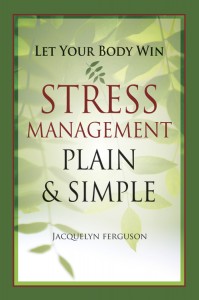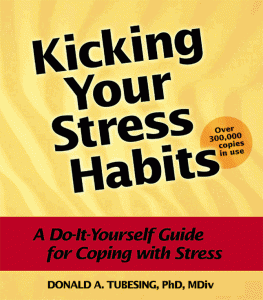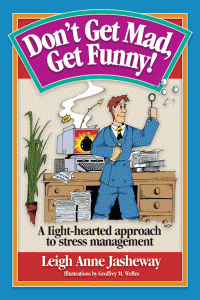Life-O-Sucter???
by Leigh Anne Jasheway
Life-O-Sucter, it’s a new word for an old problem: someone who sucks the life out of everyone he or she comes in contact with every day. Unfortunately, just as vampires can’t see themselves in the mirror, most Life-O-Sucters (abbreviated LLS) can’t see their own bad habits. Take this simple quiz to see if you’ve developed any of the symptoms and to learn what you can do to avoid turning into full-fledged LLS.
1. If a friend tells you how bad her day has been, what is your usual reaction:
a. You listen to her without judgment.
b. You offer her a shoulder to cry on.
c. You tell her how much worse your day was – in vivid gory detail.
If you answered “c,” you might be a Life-O-Sucter. LLS like all attention to be on them all the time, even in one-on-one interactions. It’s like they’re playing a game called “My Life Is Worse Than Yours!” If someone has a bad day at work, the LLS has had a bad month or year at work; if someone has a fender bender on the way to the store, the LLS has a brush with death on the freeway. There’s no sob story a LLS can’t top.
If you find the words “You think that’s bad? Listen to this,” frequently fly from your mouth, you might as well get yourself a cape and fangs. Or you could change your behavior by making a list of alternative phrases to use in these situations. Phrases such as:
I’m so sorry this happened to you.
No wonder you’re (exhausted, frustrated, angry, etc.)
Is there anything I can do to help?
It won’t be easy to stop yourself from jumping in with all the horrible things that have ever happened to you, but if you keep using the list, you’ll find this monstrous habit will soon be defeated.
2. Which of the following words apply to you:
a. Drama Queen
b. Hypochondriac
c. High-maintenance
d. None of the above
If you answered “a,” “b,” or “c,” you may be a Life-O-Sucter. Drama Queens, hypochondriacs, and high-maintenance people are all overly-involved in their own lives and can’t usually find the time to be a positive force for others. And if their lives aren’t dramatic enough, they create drama – for example, thinking every bump and bruise is cancer or every friend who’s late to lunch has either been killed on the way there or has dumped them.
One of the best ways to stop creating drama where there is none is to help someone else whose life really is rife with stress and drama. Volunteering with an organization like Habitat for Humanity, visiting kids with cancer in the hospital, or helping an illiterate adult learn to read will help convince you that your life is pretty good. And by helping others out, you put positive energy into the universe instead of negative.
3. Compared to five years ago, do you have:
a. More good friends.
b. About the same number of good friends.
c. Fewer good friends.
If you answered “C”, you may be a LLS. Eventually Life-O-Sucters lose their friends. Who really wants to stay in a friendship with someone who always one-ups you, never lets you have any attention, and whines more than a puppy left home alone for the first time? Being friends with a Life-O-Sucter is like being friends with a leach – it’s exhausting, draining, and sooner or later you can’t wait to shake them off!
The best way to reach out to friends who’ve gotten fed up and moved on is to apologize and tell them you want to change your ways. Admit that you haven’t been the easiest person to have as a friend and ask for help to do a better job. Chances they’ll have plenty of advice; all you have to do is be humble enough to listen. To show you’re serious, bring a pencil and paper and take notes!
4. When chatting with someone on the phone, do you usually:
a. Hang up as soon as you’re done with what you have to say.
b. Wait until the other person is finished talking before hanging up.
c. Hang up at a mutually-agreed upon point in the conversation.
If you answered “a,” you may be a Life-O-Sucter. LLS think that when they’ve finished saying what they have to say, the conversation is over. If you’re always the first to hang up and people have actually asked you why you always slam the phone down in the middle of their sentences, ring-ring, it’s the Life-O-Sucter clue phone!
A visual reminder may be needed to change this bad habit. Print out the question, “What else is new with you” on a sheet of labels and apply one to each phone in the house (and your cell phone too, if there’s room!) Tell yourself you’re not allowed to hang up on anyone without having asked the question at least once.
5. When it comes to face-to-face interactions, phone conversations, or Instant Messaging, do you:
a. Let other people do most of the talking.
b. Hold up your half.
c. Monopolize most of the time.
If you answered “c,” you may be a LLS. If the people around you are always starting thoughts, but never completing them, you either hang around with very forgetful people, or they never get a chance to finish what they start because you constantly interrupt them. Life-O-Sucters believe that whatever’s running through their head is more important than anything anyone else has to say.
The best way to stop this bad habit is to let your friends and relatives know you realize you have a problem and ask them to let you know when you’re interrupting them by using a unique code phrase like “Fuzzy bunny slippers” or “Brad Pitt.” Anything that will get your attention and stop you mid-thought will work. And if you choose a fun phrase, it will help you keep a lighter perspective while you change.
6. Do you usually see the glass:
a. Half full.
b. Half empty.
c. Completely empty, dirty, and you have to wash it.
Again, “c” is the Life-O-Sucting answer. Choosing the most negative perspective on life (and it IS a choice) is one of the classic symptoms of being a Life-O-Sucter. If you’re always negative, the only way your relationships work is that other people are putting positive energy out there to feed you. Eventually, they just get exhausted.
Some people keep a gratitude journal to remind themselves of the good things in their lives. I recommend keeping a “Gratitude List” on your refrigerator, right next to the grocery list. Every time you think of something good in your life, jot it down on the fridge where you will see it every time you’re in the kitchen. Regular reminders that your life is good overall can help you overcome the negativity fiend.
7. Look closely at your face in the mirror. Which do you have more of:
a. Frown lines
b. Laugh lines
If you answered “a,” you may be a LLS. Over the years, Life-O-Sucters tend to develop something I call Irritable Scowl Syndrome. You’ve seen it on people’s faces, maybe even your own. It’s that permanent look of annoyance and irritability right between the eyebrows. It’s no wonder Botox is so popular!
Changing this LLS symptom is relatively easy because you can fake a smile and it will boost your mood, no matter how you really feel. Since it’s really hard to smile and frown at the same time, you get at two-for one bonus. And, not only will you feel better, but those around you will feel more positive when you’re around. Not bad for a Life-O-Sucter!
If you’ve noticed lately that people run screaming from the room when you come in or light torches and try to run you out of town, try a few of these tips. Because nobody vants to be a Life-O-Sucter!
Leigh Anne Jasheway-Bryant, M.P.H. has been helping people learn to use their funny bones, their smile muscles, and their optimism to have a better life for fourteen years. She is a nationally-recognized keynote speaker, author of fifteen books, and winner of the 2003 Erma Bombeck Humor Writing Award. Visit her website at www.accidentalcomic.com.
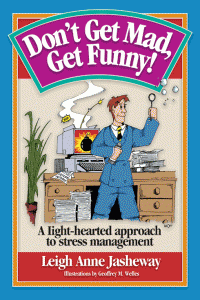
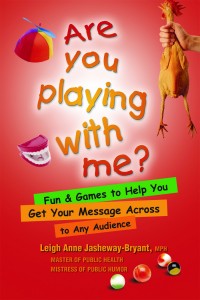
Like this:
Like Loading...

